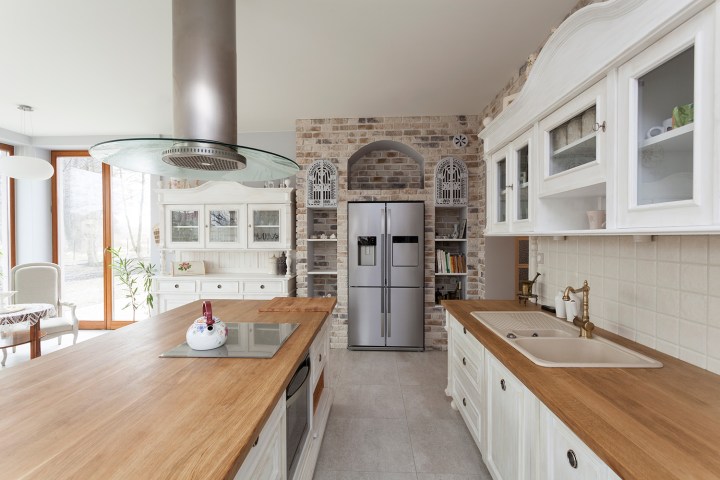
Gone are the days when a refrigerator’s only function was to keep your food cool. These days, that fridge and just about every other appliance is “smart.” But, what does that really mean? Sure, smart devices are connected to Wi-Fi, allowing us to control some aspect of them through a smartphone, tablet, computer, or a voice assistant like Amazon Echo or Google Home.
But, appliance makers touting appliances as “smart” make it sound as though my dishwasher will make the act of washing dishes easier, or as though my smart washing machine will make doing laundry suck less. And while there are some cool features to smart appliances, for the most part that’s just not the case.
It seems like almost every smart appliance maker slapped “remote start” into the smart experience just because they could.
I’d be fooling myself if I said smart appliances like washers, dryers, dishwashers, coffee makers, and ovens didn’t make daily life a little bit easier in some ways. I mean, once you have the ability to check whether or not someone ate the rest of the spinach dip in the fridge without getting off the couch, there’s really no going back.
But, personally, I have a love-hate relationship with my smart appliances. I like being able to play with the cool features, but it ticks me off when they don’t work like they promise to or aren’t all they’re cracked up to be. Plus, some features seem, well, stupid. Here are some of the things about my smart appliances that are just plain dumb.
1) Remote start
Many smart appliances offer a “remote start,” meaning that you can start it from a corresponding app on your phone. The remote start option is great in some situations, but it seems like almost every smart appliance maker slapped this option into the smart experience just because they could.
Almost all of my smart appliances, like my washing machine for instance, allow me to start the machine remotely from my smart phone. I guess this is in case I forget to start the machine while I’m actually standing in front of it? Or, perhaps the remote start feature is there in case there’s some sort of emergency, like when I’m running from zombies but need to start my washer? While it’s a neat party trick, I have a lot of trouble figuring out how useful it really is.

Any human being who has ever washed clothes knows that doing laundry requires just a little bit of planning and the use of laundry detergent. If I forgot to start the machine, I also probably forgot to get a laundry load together and put detergent in the machine. And if I’ve already done both, why not start the machine while I’m at it? What’s the point of walking away and doing it remotely later?
Even when the remote option would be useful, like on my smart stove, I don’t really get to use it. Why? My appliance requires me to push a button on my stove every time I want to use the remote feature.
2) Too many settings
Some of my smart appliances have about a million settings. I don’t use most of them, and I probably never will. There’s a setting for everything, even for the most random or obscure situations. My toaster asks me if I want my toast “dark” or “a little extra.” My dryer asks me if I’m drying “active wear” or “bedding.” I really just want unburnt toast and dry clothes.

I often find myself using my smart appliances the same way I used my old “regular” ones. I use the normal wash setting for every load of laundry I wash, the “heavy duty” or “delicate” setting for every load I dry, and the other settings just kind of sit there. If appliance makers were really smart, they’d just make one button that magically delivers the results I’m looking for.
3) Delayed start timers
On certain things, like my coffee maker, the delay start timer is useful. I can set everything up the night before and have a fresh pot of coffee waiting for me when I wake up. However, some of my kitchen appliances could do without a delayed start timer.

For instance, my smart multi-cooker has a 24-hour delayed-start option. I have yet to think of many good uses for this feature that don’t involve me getting food poisoning. Let’s say I’m making chicken and rice, and I put the ingredients in the pot and set the 24-hour delay start timer. I’d probably end up with salmonella rather than a tasty meal. No thanks.
4) Form over function
When I hear an appliance is “smart,” that makes me think it’s going to perform its main function better than a regular appliance, even though I know that’s not what “smart” means. And it’s true that many of my smart appliances are superior to their dumb old counterparts. However, this isn’t the case for all of my smart tech. For some of my appliances, it seems like Wi-Fi connectivity and those smarts takes precedence over functionality.

It’s as if someone connected an app to my washing machine and called it smart, but forgot to make sure it actually worked well as a washing machine. Between the sporadic error messages I get and the fact that I miss my old dumb top load washer, sometimes I want to kick the damn thing. Then I remember that even thought it’s “smart,” it doesn’t have feelings (at least I think it doesn’t), and I’d really only be hurting my foot.
In any case, until appliance makers figure out a way to get my dishes inside my dishwasher or transfer my clothes from my washer to my dryer, the label “smart” doesn’t do much for me.


